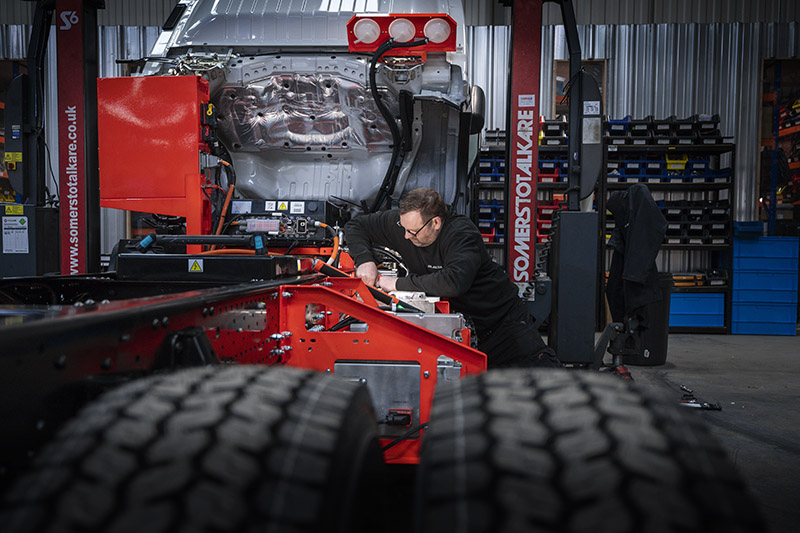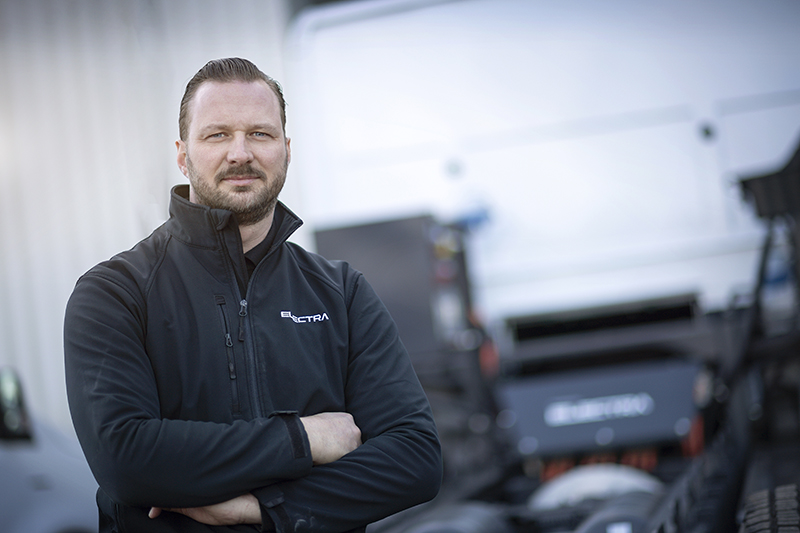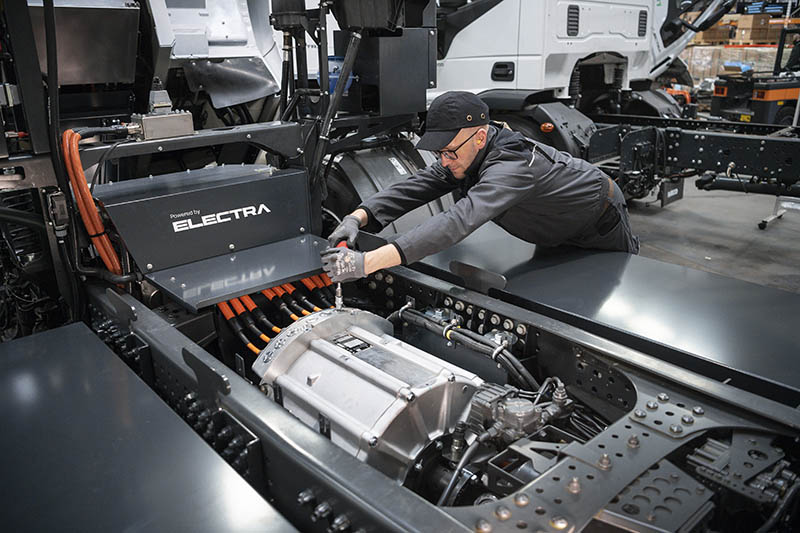
Originally founded in Blackburn in Lancashire, Electra Commercial Vehicles, winner of the 2020 Motor Transport Innovation Award, recently moved across the Pennines to Brighouse in West Yorkshire to accelerate growth of its range of battery electric vehicles (eHGV). MHW caught up with MD Benjamin Smith who explained the rationale behind the move.
Electra Commercial was established in Lancashire by Yorkshire entrepreneur Sid Sadique, in 2018 and as Smith explains “we had outgrown that facility by 2020. However, we were cautious about growing too fast because, as we had seen with other similar companies, that could cause our demise. We have seen them grow too big, too quickly and fail as a result, so we strategically chose to keep our overheads lower. We have purposefully stayed small, only promising what is achievable, most importantly learning and improving along the way.
By 2023 we were ready to move, but because we need somewhere that can accommodate high vehicles, it took until now to find the right facility to meet our needs. Most sites had loading bays that just catered for home deliveries.
Fortunately, our chairman had a college friend (who’s company made ambulances), was vacating their 38-acre site and it fit the bill for what we needed. We started the move late May and it is still ongoing as we try and work between two sites.
Growing capacity
“Electra creates fully electric, and hydrogen powered commercial vehicles for a global market and a cleaner future – all based on OEM glider chassis platforms. For over 6 years our team has worked tirelessly in a small facility developing and delivering our products. This new chapter will mean we can expand our operations, keeping pace with growing customer needs while fostering creativity and innovation.

Battery Exchange
Our new Brighouse facility equips us to streamline operations and meet the increasing demand for our cutting-edge battery electric and hydrogen fuel cell electric commercial vehicles, and concurrently allows us to launch our ELECTRA EXchange division allowing our customers to upcycle their existing ICE vehicles for new Electra EV power and drive systems and our dedicated technical training facility
We currently have a staff of 50 and aim to grow that to 80 people onboard by quarter 3. At our old site we were only able to build around 10-11 trucks at any one time. The new facility gives us the capacity to build 21 trucks indoors in the build bays, with an additional 4 service and parts bays, 5 R &D bays, 1 bay for fabrication and design and 2 training bays, with a further 4 spare bays. There are also 4 external bays.
We are scheduled to build 120 vehicles this year, thanks to the bigger facilities and our major engineering design change across the platforms. It could be more – if someone says they want 100 trucks we can ramp up and build the product anywhere in the world in less than two weeks.
We buy in the chassis OEM body from manufacturers such as Mercedes-Benz Econic, Avico, Isuzu, Iveco, or Dennis Eagle, and then fit our kit to it. Now we are no longer held back by facility constraints.”

“We are a niche player so even though they have their own electric products coming they will carry on supplying us,” he says. “We can do an Econic with 140kW or 420kW of batteries whereas the eEconic comes with 300kW and that’s it. We can put the batteries on either side or remove from one side, and also do any wheelbase. We can deliver multiple platforms today with flexibility/modularity at the heart of the design.
“We can build vehicles other people can’t. The Eurocargo isn’t being electrified by Iveco so that gives us the whole range to focus on.”
Hydrogen Cell Technology
We pioneered a trial with Sainsburys in 2023 over a four month period, as one of the early adopters. It involved a 19-tonne refrigerated electric truck powered by batteries and a hydrogen fuel cell. Backed by a robust hydrogen refuelling infrastructure supplied by strategic partner Element 2, this was the first HGV of its type to operate on UK roads.
The vehicle had multi-temperature insulated body supplied by Solomon, a Carrier Transicold electric refrigeration unit and a Dhollandia tail-lift. The 225kWh battery packs were supplemented by a German-made Proton Motors 44kW hydrogen fuel cell fed from four 5kg hydrogen tanks.
It was used on a 208-mile route from the supermarket’s depot in Sherburn-on-Elmet to Newcastle and back. Data collected from the trial showed that the truck It created zero emissions versus an average of 314kg of CO2 emitted per day by a diesel truck and used approximately 65% of its hydrogen capacity per trip, giving it a range of at least 320 miles on one fill of hydrogen. In the trial the best range achieved was 411 miles.
There are a further 9 more vehicles being tested in Teesside. The oldest Hydrogen powered vehicle is 5 years old. We are building a case and collecting data. An operation in Brighton & Hove is able to operate for 2 days without charging and sometimes up to 3 days. The challenge is getting he charging infrastructure in place.
Commercial electric vehicles absolutely work but their initial cost is high and that is the frustration across the whole industry , so uptake has slowed slightly.
Homologation approved.
“Refurbished vehicles that are 2-3 years old, that still have life left in them and are still viable and are not worn out. We take the diesel drive line out and plate it to take a higher weight of 26 to 27kg. We can rebuild every type of vehicle including refrigerate vehicles.
Port authorities are looking at electric shunters- which are very heavy duty trucks and their cranes are also electrified.
Refuse trucks is a core market for us. Our sister company NRG Riverside- the UK’s largest municipal and specialist fleet hire company, operates a fleet of 2,000 vehicles which are all less than 5 years old. They have been instrumental in electrifying specialist and municipal fleets across the UK, providing electric vehicles on contract and short-term hire.
Range extension
Electra currently produces mainly rigid electric trucks between 12 tonnes and 27 tonnes GVW, but we are now developing a 16-tonne Eurocargo 4x2 tractor unit that could go up to 33 tonnes, with a 19-tonne unit achieving 40 tonnes already available. We are also looking to launch the first 12-tonne tractor unit on our existing 12.5-tonne platform.
We can fit a range of motors but the majority use a 350kW direct drive motor and an active liquid cooling system, to keep the batteries within a specified temperature range which improves their performance and life. This also facilitates fast charging using a 150kW DC supply, a charge rate than can overheat batteries without a cooling system.
Battery packs are fitted to the customer specification; the 700V batteries are made by Chinese manufacturer CATL, said to be the world’s biggest EV battery maker.
As part of our net-zero strategy, we repurpose our batteries and tech from the vehicles for a second life in energy storage.
EVs really do need less maintenance than diesels
One of the biggest cost savings when switching from diesel to electric should be in reduced routine maintenance. While the conventional running gear, including brakes, steering, suspension and tyres will still require regular – ideally six-weekly, inspection, the electric drive train is virtually maintenance-free.
EVs still use oil for the air compressor – but it needs changing only every 3,000 hours, and Electra advises annual changes. While there is less than a litre, it is not run of the mill 10W40 and a service kit costs around £300.
Electra supplies all its vehicles with a built-in charger so the customer does not need to buy a separate charger.
Sustainable future
Smith adds “Electra have put more electric HGVs on the road than anyone else and we are dedicated to providing sustainable transportation solutions for businesses worldwide. We want to work to sped up electrification to drive towards net zero. Delivering clean, noiseless, zero-emission commercial vehicle solutions that exceed diesel performance. Looking ahead, we are excited about our growth and leading the way in innovation and electrifying commercial vehicles for a greener future”.